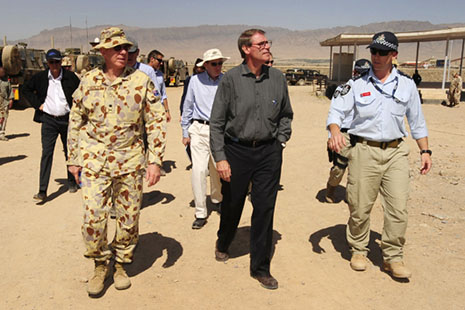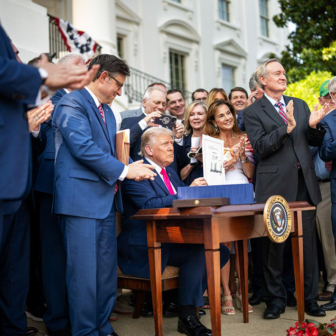IT TOOK a retired chief of the Australian army, Peter Leahy, to say what the major political parties won’t admit about the war in Afghanistan. As Australian troops continue to kill people and be killed, Leahy told ABC TV’s Lateline on 28 July, “We are not going to solve counterinsurgencies like this with only military means. Essentially, the solution is a political solution, and you don't do politics without talking, and I think it's essential they talk to everybody who's involved.” When asked if this included the Taliban insurgents, Leahy replied, “Yes.” For good measure, he added that parliament should have the right to overturn a government decision to send Australian troops to war.
Both Julia Gillard and Tony Abbott stick to the line that the troops are there to ensure that Afghanistan never again becomes a safe haven for terrorists. Gillard usually adds that their role is to help train the Afghan army until it is able “to guarantee stability and security.” Apart from there being almost no prospect that the Afghan army will be able to so, the explanation glosses over the fact that some of Australia’s 1550 troops have been doing a lot more than training.
Although the Australian army does not like the term, its special forces contingent, comprising about 300 troops, has engaged in what the Israeli army calls “targeted killings.” Despite the impression Coalition ministers like to give to the contrary, the Australian Defence Force has never claimed to have killed members of the al Qaeda terrorist group during one of these operations. But it has assassinated an unspecified number of supposedly important members of Taliban, the repressive Islamic group that has the leading role in a loosely structured insurgency against President Hamid Karzai’s corrupt and incompetent government. Not surprisingly, innocent civilians, including children, are sometimes killed in botched operations – making it harder to win civilian support for the fight against opponents of the government.
But the foreign minister, Stephen Smith, seemed to have trouble coming to grips with the reality of civilian casualties when he discussed the defence department taskforce established to examine 75,000 classified US documents about the Afghan war, released by WikiLeaks last month. Smith told Sky News on 27 July that the taskforce’s job is “firstly, to make sure that there's no suggestion that Australian troops have been involved in civilian casualties. We run very high standards on issues like that.”
Smith’s statement is puzzling. He is clearly aware that Australian troops have killed and wounded civilians. He should also know that there are solid grounds for rejecting the claim that high standards always apply. The exact number of deaths is in dispute, but Australian troops have killed several children, as well as adult civilians, police and a fiercely anti-Taliban district governor. The majority of these deaths would not have occurred if the Australian special forces did not conduct nighttime operations in villages where there is a distinct likelihood that they will kill innocent people.
So what did Smith mean when he said that the taskforce on the WikiLeaks material was checking to ensure there’s no suggestion that Australian troops have been involved in civilian casualties? Perhaps it was simply a slip of the tongue. Alternatively, Smith might have been concerned that the US material contained references to Australians employed by US-sponsored covert action squads in Afghanistan (and earlier in Iraq), which sometimes ignore the laws of war. Although most of these Australians originally trained with the Perth-based Special Air Service regiment of the Australian army, they have since severed the relationship.
The Australian Financial Review reported on 28 August 2004 that some Australians trained near Paris with one of several groups established after 11 September 2001 to operate outside official military structures. The Washington Post later reported that this group was codenamed Alliance Base (a unsubtle reference to the English translation of “al Qaeda” as “the base”). US intelligence agencies set up Alliance Base to terrorise members of al Qaeda and its affiliates with assassination and kidnapping operations
The US military also has established unacknowledged, or “black,” units. The WikiLeaks material shows that one of these units operating within the NATO coalition in Afghanistan, Task Force 373, hunts down and kills or captures alleged members of the Taliban and al Qaeda. Their names are on a list of 2000 targets called JPEL (the joint prioritised effects list). The documents show that Task Force 373 has killed civilians, including children, as well as police who’ve been caught up in its operations. Smith could have been worried that some serving members of the Australian Defence Force might have been seconded to Task Force 373 or a similar “black” unit in Afghanistan. Another possibility is that he was concerned that the US documents might refer to the activities of the Australian Secret Intelligence Service, or ASIS, for which he has ministerial responsibility. According to Australian military sources, members of that organisation are associated with paramilitary operations in Afghanistan.
In any event, the Australian Defence Force doesn’t dispute that its own Special Operations Task Group in Afghanistan has killed civilians when entering homes at night in the hope of killing or abducting senior members of the Taliban while they’re asleep. These operations can end disastrously because of poor surveillance and planning, or the failure to check the accuracy of intelligence that often wrongly names villagers as members of the Taliban. Regardless of the preparation, the adrenaline-charged nature of these operations makes it hard to maintain the discipline required to avoid civilian casualties.
Even highly trained soldiers can make deadly mistakes during mock operations in circumstances that are less stressful than those that prevail in Afghanistan. The risk of killing innocent people was highlighted last October when an experienced member of an Australian commando unit was shot dead during a training exercise using live ammunition at a base in Adelaide. Another commando killed the soldier while taking part in night training intended to simulate an operation in a housing compound during an upcoming Afghanistan deployment.
Given the inherent risks, these operations always struggle to serve a worthwhile purpose. Hoping to kill a member of the Taliban is not enough, especially after the chief of the US armed forces, Admiral Michael Mullen, warned Congress in September 2008, “We can’t kill our way to victory.”
The dangers were highlighted on 12 February last year when an Australian commando unit, including reservists from state police forces, killed five children and an adult during a nighttime raid. Some senior Australian military officers are astonished that reservists were allowed to participate in such a risky operation when the SAS, Australia’s Special Air Service, only uses full-time soldiers selected for their ability to remain calm under stress.
The decision to raid the home was reportedly taken at short notice, apparently without sufficient attention being paid to the presence of women and children who had arrived the day before in preparation for a wedding. The high-ranking Taliban official presumed to live there was not present, nor did he live anywhere near the village. Instead, the home’s owner had a similar name. SBS’s Dateline subsequently reported that the commandos sprayed machine-gun bullets into a room in which there were children. It is understood that military investigators later obtained a video tape of the attack showing that the commandoes also threw a grenade into the room, then waited before tossing another one. One issue at stake is whether they knew that children were present by the time this second grenade was thrown.
Although he did not know what had happened, the then defence minister, Joel Fitzgibbon, said within hours of the attack that the troops had obeyed the rules of engagement. But, as the Afghan government correctly complained, they had not followed a NATO directive applying to Australian troops that Afghan soldiers must be present on these operations. Because botched operations bolster support for the Taliban, the directive also requires foreign troops to retreat if there is a risk of civilian casualties.
After the killings, the chief of joint operations of the Australian forces began an internal inquiry into an operation ultimately under his command. The Australian Defence Force’s investigative service did not take over until mid-2009. Its report, handed to the Director of Military Prosecutions in November, raised potential grounds for disciplinary action. The Defence department announced last month that the prosecutor had not yet made a final decision regarding disciplinary action.
AT THIS STAGE, it is far from obvious that Smith is in a position to assert that the Labor government has always maintained “very high standards” in relation to civilian deaths. It should be acknowledged, however, that within a few months of taking over as defence minister in mid 2009, John Faulkner insisted that the Australian Defence Force become more open about incidents involving civilian casualties and much more careful about undertaking nighttime operations against suspected members of the Taliban. The operations have not been banned, but they have been curtailed.
There is no good reason to keep the special forces in Afghanistan. They are not engaged in training the Afghan army – the job that Gillard says justifies the continuing presence of Australian troops. During the election debate, in an echo of John Howard’s earlier stand on the wars in Iraq and Afghanistan, Julia Gillard said, “The thing that defines how long we’re going to be there is getting the job done, not a deadline in time.” It is almost ten years since foreign forces helped topple the then Taliban government in Kabul. If the Karzai government is not capable of running a half-decent government by now, let alone defending itself, it’s hard to see when it will be. Foreigners can train more troops, but this doesn’t mean the graduates won’t join the insurgents if they look like getting the upper hand.
On Monday, the Dutch withdrew their 1950 troops serving in the Oruzgan province with the Australians. Next year, the Canadians are expected to withdraw their 2500 troops from another province. If Julia Gillard or Tony Abbott keeps Australian troops in Afghanistan after winning the election, they should at least stop pretending this will make any difference to the outcome.
No good result seems likely for the Afghan people. If the Taliban gains control of a large part of the country, however, the rest of the world has some reason to hope that it will refuse to let al Qaeda re-establish terrorist training camps. The Taliban has a tense relationship with al Qaeda, which has different goals. These tensions could improve the chances that the talks suggested by Peter Leahy and many others will help persuade the Taliban to cut ties. After all, the Taliban is interested in regaining power within Afghanistan, not in committing terrorist acts around the globe that would only bring severe retaliation. In any event, al Qaeda has secure havens in Pakistan and elsewhere, as well as a more elusive presence on the internet.
Unlike the Taliban, al Qaeda also appears to be on the wane. It could fade further, if deprived of the recruitment tool created by the presence of foreign troops in Afghanistan. Baroness Manningham-Buller, a former head of the British domestic intelligence service MI5, recently told the Chilcot inquiry that the invasion of Iraq “substantially” increased the terrorist threat to Britain and radicalised some young British Muslims “who saw our involvement in Iraq and Afghanistan as being an attack on Islam.” Withdrawing foreign forces from Afghanistan could reduce al Qaeda’s appeal and ensure that Australian troops no longer kill children during counter-productive operations. •




